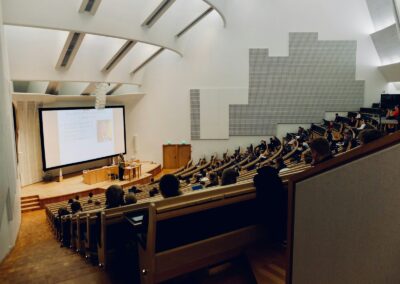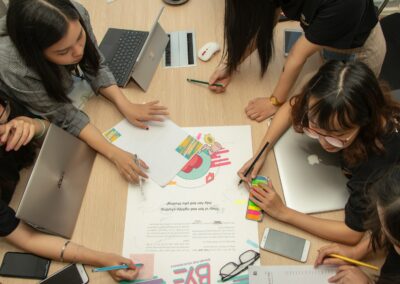Transforming Education in UAE and Saudi Arabia with AI-Powered Adaptive Learning
Enhancing Student Engagement through AI-Powered Adaptive Learning
AI-powered adaptive learning technologies have the potential to revolutionize education by significantly enhancing student engagement and academic performance. These innovative systems utilize artificial intelligence to tailor educational content to the individual needs of each student, providing a personalized learning experience that adapts in real-time based on student interactions. In the UAE and Saudi Arabia, where there is a strong emphasis on leveraging modern technology to improve educational outcomes, the integration of AI-powered adaptive learning can lead to substantial advancements in student engagement.
Student engagement is a critical factor in the learning process. Traditional teaching methods often fail to address the diverse learning styles and paces of individual students, leading to disengagement and lack of motivation. AI-powered adaptive learning systems overcome this challenge by continuously analyzing student performance and adjusting the difficulty level and type of content accordingly. This ensures that students are always presented with challenges that are appropriate to their skill level, keeping them engaged and motivated to learn.
For example, an AI-powered platform might identify that a student is struggling with a particular concept in mathematics. The system can then provide additional practice problems, offer hints, and even present the material in different formats such as videos or interactive simulations. This personalized approach helps students overcome their difficulties and reinforces their understanding, leading to higher engagement and better academic outcomes. In Dubai and Riyadh, where educational institutions are at the forefront of technological innovation, implementing AI-powered adaptive learning can create more dynamic and interactive learning environments.
Improving Academic Performance with Adaptive Learning Technologies
The impact of AI-powered adaptive learning technologies on academic performance is profound. By providing personalized instruction and immediate feedback, these systems help students master concepts more effectively and efficiently. Research and case studies have shown that adaptive learning can lead to significant improvements in student achievement, making it a valuable tool for educators in the UAE and Saudi Arabia.
One of the key advantages of adaptive learning technologies is their ability to identify and address learning gaps in real-time. Traditional assessment methods often fail to detect specific areas where a student may be struggling until it is too late to intervene effectively. In contrast, AI-powered systems continuously monitor student performance and provide instant feedback, allowing educators to address issues promptly. This proactive approach helps prevent students from falling behind and ensures that they receive the support they need to succeed.
Moreover, adaptive learning technologies can enhance the efficiency of the learning process by optimizing the time spent on each topic. By tailoring the pace and difficulty of instruction to the individual student’s needs, these systems ensure that students are neither bored with material that is too easy nor overwhelmed by content that is too challenging. This optimized learning experience helps students achieve their academic goals more quickly and effectively. In regions like Dubai and Riyadh, where educational excellence is a priority, the adoption of AI-powered adaptive learning can lead to higher academic performance and better student outcomes.
Case Studies and Research on Adaptive Learning in Education
Several case studies and research initiatives have demonstrated the positive impact of AI-powered adaptive learning technologies on student engagement and academic performance. For example, a study conducted by the Gates Foundation found that students using adaptive learning platforms showed significant gains in mathematics and reading proficiency compared to their peers in traditional classrooms. These findings highlight the potential of adaptive learning to transform education and improve student outcomes.
In another case study, an educational institution in Dubai implemented an AI-powered adaptive learning platform in its science curriculum. The results were impressive, with students showing marked improvements in their understanding of complex scientific concepts and higher overall academic performance. The personalized approach of the adaptive learning system helped students grasp difficult topics more effectively and retain information better, leading to long-term academic success.
In Saudi Arabia, a pilot program using AI-powered adaptive learning technologies in primary schools demonstrated similar results. Students using the adaptive learning platform showed greater engagement, improved academic performance, and higher levels of motivation compared to those in traditional classrooms. The success of this pilot program has led to plans for expanding the use of adaptive learning technologies across more schools in the region, showcasing the potential of these systems to enhance education on a larger scale.
Implementing AI-Powered Adaptive Learning Technologies
To successfully implement AI-powered adaptive learning technologies, educational institutions must adopt a strategic approach that addresses technical, pedagogical, and organizational challenges. By doing so, they can create a supportive environment for these innovative tools and maximize their potential benefits.
One effective strategy is to start with pilot programs that test adaptive learning technologies in a few classrooms or subjects before scaling up to a broader implementation. This phased approach allows institutions to identify and address any issues, gather feedback from students and educators, and refine their strategies based on these insights. In Dubai and Riyadh, where educational innovation is a key focus, pilot programs can provide valuable data and inform decision-making for larger-scale implementations.
Collaboration with technology providers and experts is another critical factor for success. Educational institutions should seek partnerships with companies specializing in AI-powered adaptive learning to gain access to cutting-edge technologies and expertise. These partnerships can facilitate the development and customization of adaptive learning platforms to meet the specific needs of students and educators in the UAE and Saudi Arabia.
Professional development and support for educators are also essential for the successful integration of adaptive learning technologies. Training programs and workshops can help teachers understand how to effectively use these tools and incorporate them into their teaching practices. By investing in professional development, educational institutions can ensure that their staff are equipped with the skills and knowledge needed to maximize the benefits of adaptive learning.
Leadership and Management in Implementing Adaptive Learning
Effective leadership and management are crucial for the successful implementation of AI-powered adaptive learning technologies. Business executives and mid-level managers in the UAE and Saudi Arabia need to be knowledgeable about the latest technological advancements and possess the skills to drive digital transformation within their organizations. This involves understanding the technical aspects of adaptive learning and fostering a culture of innovation and agility.
Leadership in this context means being able to navigate the complexities of integrating adaptive learning technologies into existing educational systems and processes. Managers must be adept at project management, coordinating cross-functional teams, and managing resources effectively to implement these technologies successfully. This includes setting clear objectives, monitoring progress, and ensuring that the solutions deliver the intended benefits.
In Dubai and Riyadh, where the pursuit of technological innovation is a national priority, the ability to implement adaptive learning technologies effectively can provide a significant competitive advantage. By embracing these technologies, organizations can enhance their educational offerings, improve student outcomes, and drive business success. Strong leadership and management skills are crucial for navigating this transformation and achieving sustainable growth.
Project Management in Adaptive Learning Deployment
Effective project management is essential for the successful deployment of AI-powered adaptive learning technologies. Given the complexity and scale of these projects, a structured and methodical approach is required. This involves detailed planning, risk assessment, and stakeholder management to ensure that the project stays on track and meets its objectives.
In the context of the UAE and Saudi Arabia, where large-scale educational initiatives are common, project management skills are particularly valuable. Managers need to balance short-term deliverables with long-term strategic goals, ensuring that each phase of the project contributes to the overall vision. This requires a deep understanding of both the technical and educational aspects of adaptive learning technologies.
Furthermore, project management in the adaptive learning space often involves navigating regulatory landscapes and ensuring compliance with local and international standards. This adds an additional layer of complexity, requiring managers to stay updated on the latest regulatory developments and adapt their strategies accordingly. By doing so, they can ensure that their adaptive learning initiatives are not only innovative but also compliant and sustainable.
Conclusion: The Future of Education with AI-Powered Adaptive Learning
The adoption of AI-powered adaptive learning technologies is set to revolutionize education, particularly in the UAE and Saudi Arabia. By leveraging the principles of AI and modern technology, these platforms offer a secure and efficient way to enhance the learning experience for students. For business leaders and managers, embracing adaptive learning technologies presents an opportunity to enhance educational outcomes, improve operational efficiency, and achieve business success.
As the field of education continues to evolve, the role of adaptive learning will become increasingly important. By staying at the forefront of technological advancements and fostering a culture of innovation, organizations in Dubai, Riyadh, and beyond can position themselves for sustained growth and success in the digital age.
—
#AIPoweredLearning, #AdaptiveLearning, #StudentEngagement, #AcademicPerformance, #AIinEducation, #UAE, #SaudiArabia, #Riyadh, #Dubai, #ModernTechnology, #BusinessSuccess, #LeadershipSkills, #ProjectManagement























